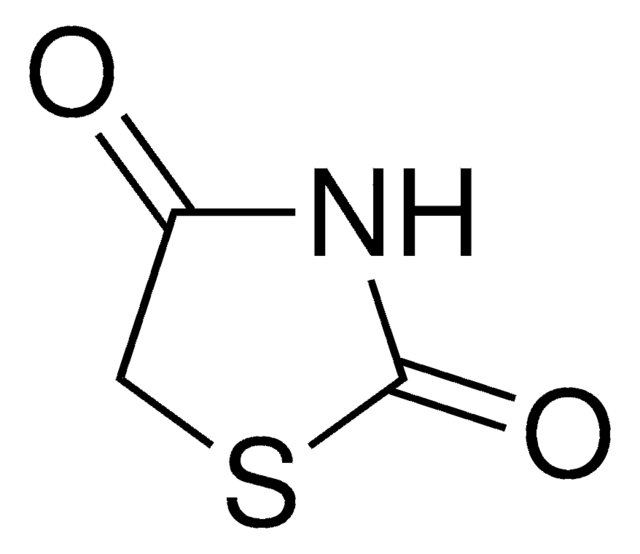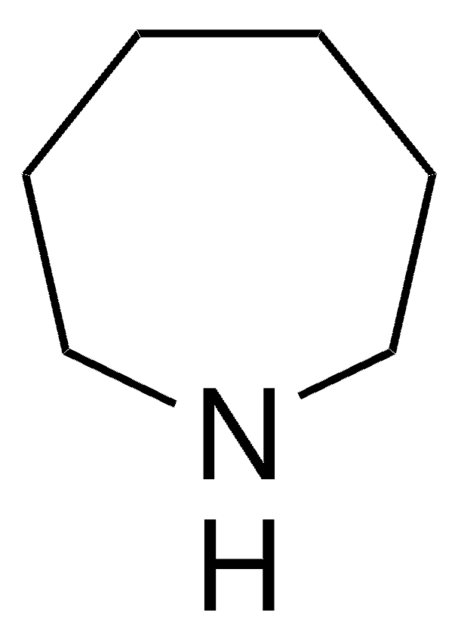All Photos(1)
About This Item
Empirical Formula (Hill Notation):
C3H7NS
CAS Number:
Molecular Weight:
89.16
EC Number:
MDL number:
UNSPSC Code:
12352100
PubChem Substance ID:
NACRES:
NA.22
Recommended Products
Assay
95%
form
liquid
refractive index
n20/D 1.5508 (lit.)
bp
72-75 °C/25 mmHg (lit.)
density
1.131 g/mL at 25 °C (lit.)
SMILES string
C1CSCN1
InChI
1S/C3H7NS/c1-2-5-3-4-1/h4H,1-3H2
InChI key
OGYGFUAIIOPWQD-UHFFFAOYSA-N
Application
Thiazolidine was used in the synthesis of homogeneous penicillamine disulphide cross-linked polypeptides.
Signal Word
Warning
Hazard Statements
Hazard Classifications
Flam. Liq. 3
Storage Class Code
3 - Flammable liquids
WGK
WGK 3
Flash Point(F)
132.8 °F - closed cup
Flash Point(C)
56 °C - closed cup
Personal Protective Equipment
dust mask type N95 (US), Eyeshields, Gloves
Certificates of Analysis (COA)
Search for Certificates of Analysis (COA) by entering the products Lot/Batch Number. Lot and Batch Numbers can be found on a product’s label following the words ‘Lot’ or ‘Batch’.
Already Own This Product?
Find documentation for the products that you have recently purchased in the Document Library.
Customers Also Viewed
Yasaman Ramazani et al.
Carbohydrate research, 439, 9-15 (2016-12-30)
Cystinosis is a genetic disorder caused by malfunction of cystinosin and is characterized by accumulation of cystine. Cysteamine, the medication used in cystinosis, causes halitosis resulting in poor patient compliance. Halitosis is mainly caused by the formation of dimethylsulfide as
Mayra Rengifo Carrillo et al.
Phytochemistry, 140, 166-173 (2017-05-14)
The phytochemical study of two cultivars of Pittosporum tenuifolium Banks & Sol. ex Gaertn, "variegatum" and "gold star", led to the isolation of eight oleanane-type glycosides: seven previously undescribed and a known one. Their aglycons are oxygenated oleanane derivatives as
Nampoina Andriamisaina et al.
Phytochemistry, 160, 78-84 (2019-02-12)
The phytochemical study of Ornithogalum dubium Houtt. (Asparagaceae) led to the isolation of five undescribed steroidal glycosides together with two known ones. Their structures were established by using NMR analysis and mass spectrometry as (25R)-3β-hydroxyspirost-5-en-1β-yl O-α-L-arabinopyranosyl-(1 → 2)-α-L-rhamnopyranoside, (25S)-3β-hydroxyspirost-5-en-1β-yl O-β-D-glucopyranosyl-(1 → 6)-β-D-glucopyranoside, (22S)-16β-[(α-L-rhamnopyranosyl)oxy]-22-hydroxycholest-5-en-3β-yl O-β-D-glucopyranosyl-(1 → 4)-β-D-glucopyranoside
Structural analysis of oleanane-type saponins from the roots of Wisteria frutescens.
Anne-Sophie Champy et al.
Magnetic resonance in chemistry : MRC, 55(6), 595-600 (2016-11-20)
David Pertuit et al.
Natural product communications, 10(6), 1005-1007 (2015-07-23)
A new aromatic compound 3,4,5-trimethoxyphenyl-1-O-(4-sulfo)-β-D-glucopyranoside (1), in addition to two triterpenoid saponins (chebuloside II, arjunoglucoside II), two triterpenes (arjunolic acid and 3-betulinic acid) and sitosterol-3-O-β-D-glucopyranoside have been isolated from the barks of Terminalia catappa. Their structures have been established on
Our team of scientists has experience in all areas of research including Life Science, Material Science, Chemical Synthesis, Chromatography, Analytical and many others.
Contact Technical Service
















